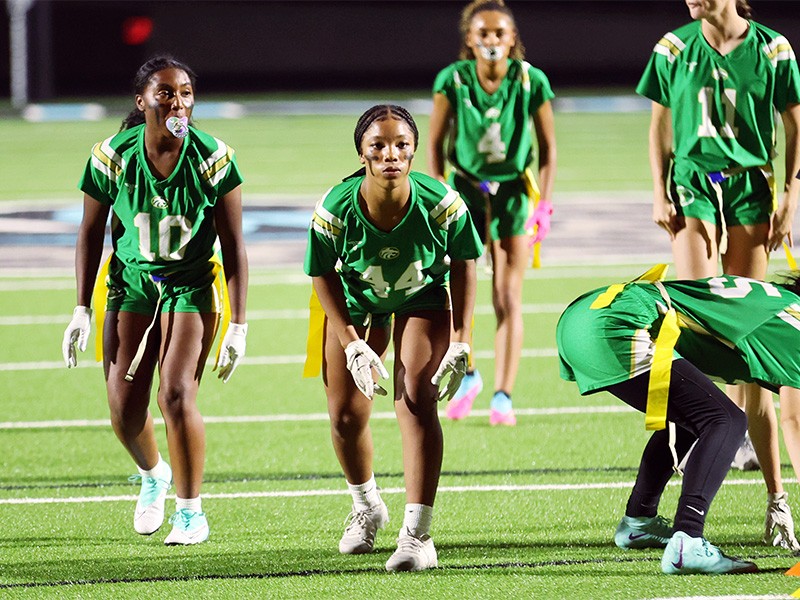It’s definitely one of the fastest growing sports, not just in the United States, but around the world. In fact, flag football has become so popular over the past half-dozen years that there is even an exhibit now at the Pro Football Hall of Fame in Canton, Ohio.
The latest statistics say flag football is played in more than 100 countries and on six continents by over 20 million people, men and women, boys and girls, of all ages. It is set to become an Olympic sport in 2028.
And it is rapidly catching on in Georgia at the prep level as a girls varsity sport. Heading into the 2024-25 sports season, 270 total teams in four divisions will be fielding teams in the Georgia High School Association.
The 2024 campaign is set to begin on Sept. 30. Teams can hold their first practices on Sept. 9.
Georgia is one of just nine states (Alabama, Alaska, Arizona, California, Florida, Georgia, Illinois, Nevada, and New York) that have sanctioned flag football as a girls varsity sport. Two other states -- Colorado and Montana -- are expected to sanction flag football this year and 17 more are in various stages of pilot programs.
According to the National Federation of State High School Associations (NFHS), “the popularity of flag football has been growing at the youth levels for the past 10 years. In 2023, about 500,000 girls ages 6-17 played flag football – a 63 percent increase since 2019.”
In the 2022-23 school year, 913 schools fielded girls flag football teams with more than 20,000 participants nationwide.
But while the sport is expanding almost exponentially in some areas around the country and in Georgia, the northeast Georgia area has been slow to get things off the ground. Of the 26 northeast Georgia-area schools covered by AccessWDUN Sports, only four -- Buford, East Jackson, Jackson County, and North Forsyth -- will have teams this season.
But before you start questioning school systems as to why they have not added it to their repertoire, several key factors are involved.
“There needs to be pervasive interest, the numbers need to be consistent year-to-year, and of course, you need the resources to fund it,” Hall County Athletics Director Stan Lewis said. "There are a lot of factors that go into adding any new sport."
But despite the 270 programs already in existence around the state, the timing of the season may be the biggest obstacle. There already are varsity girls sports in the fall with softball and volleyball, and the basketball preseason is also in full swing by September and October, making time commitments an issue, certainly at some of the smaller schools.
Hall County, the largest system in northeast Georgia, does not offer flag football at any of its seven high schools as a sanctioned varsity sport. But for the first time in 2024 two schools -- Johnson and West Hall -- with cooperation from the Atlanta Falcons, will field club-level teams.
“The Falcons have been asking us for a couple of years to get some teams together and this year they provided us with a grant for schools that wanted to start teams,” Lewis said. “Johnson and West Hall were the only schools that showed any interest so far. But with so many sports overlapping as far as being able to get that commitment, it’s a challenge for sure.”
Buford flag football coach Sean Gilbert, who has been involved with the main Wolves football program for more than a decade and is currently its Director of Football Operations, said it’s been fun -- and challenging.
“Last year was our first year fielding a team and they asked me to handle it,” Gilbert said. “It’s a blast, really. It’s been fun to see how many girls wanted to play football. There are a lot of adjustments from regular football on how to run an offense so you really have to be creative.
“We were fortunate to have 40 girls show up for tryouts, which is a big number. But there were several girls who wanted to play that couldn't because of their commitments to other sports going on at the same time. I don’t know how you solve the timing of the season because there are other sports in the spring so you would have the same issue. That’s going to be the biggest challenge no matter when the season is held.”
Gilbert said a possible solution, at least for the fall, would be to move girls softball to the spring.
"That's when most states have their (softball) seasons and that's also when colleges play," he said. "But that also means with baseball umpires, who many also do softball in the fall, you would run into the situation of maybe not having enough umpires for that so no matter when they play, there's going to be an issue somewhere."
For now, the four NEGa area teams playing varsity -- and the two club teams in Hall County -- will get set to get to work beginning in early September.
Buford and North Forsyth will play in the state’s largest classification, Division 4, with the Lady Wolves in Area 8 and the Lady Raiders in Area 6. East Jackson and Jackson County both will play in Division 2, with the Lady Eagles in Area 8 and the Lady Panthers in Area 7.
And also for now, Lewis said he is not sure when Hall County will go beyond club level status.
“We had talked about this but the idea was tabled because the schools did not have the interest from the numbers to start programs,” he said. “There is no timetable as a district to implement it as an official sport in the near future. But with the two pilot programs we have and the Falcons showing interest to help, who knows what will happen down the road.”










